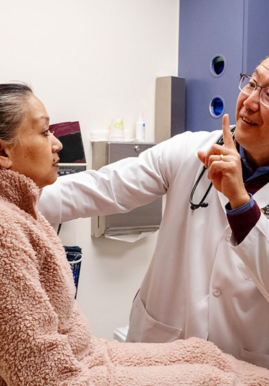The UW Department of Psychiatry and Behavioral Science has launched a program to expand mental health services across the state.
The program will train psychiatrists to partner and consult with primary-care providers and other healthcare workers. The approach is designed to improve access to evidence-based mental healthcare in every county in the state.
Washington state’s mental healthcare system ranked 47th in the nation in the Mental Health America 2016 State of Mental Health Report. The low ranking underscores the need to strengthen the existing system.
The UW Integrated Care Training Program will be the first in the country to train psychiatrists specifically to partner with primary-care providers and other healthcare professionals in primary-care clinics, school and community health centers, rural hospitals, and correctional facilities.
The program will expand the integrated-care training of UW psychiatry residents and will create a one-year clinical fellowship for psychiatrists seeking additional specialty training in integrated care. The program also will offer continuing medical education for practicing psychiatrists.
The program is modeled after a successful integrated care approach created by a team at the UW Advancing Integrated Mental Health Solutions Center, headed by Jürgen Unützer, chair of the UW Department of Psychiatry and Behavioral Sciences. The AIMS Center has trained more than 6,000 clinicians around the world to implement effective integrated care.
Washington state Sen. Randi Becker, R-Eatonville, chair of the Senate Health Care Committee, led the effort in securing the funding, which was appropriated in July. The program will receive $2 million a year for four years. The first cohort of Integrated Care Fellows will begin their training in 2016.
The funding follows an announcement earlier this year by Washington state Gov. Jay Inslee and the Washington State Health Care Authority that the state will work to improve access to “whole-person care” for all Washingtonians. This will be done by fully integrating mental health, chemical dependency and physical healthcare by the year 2020.
According to a 2012 paper in The Lancet, untreated mental health and substance-use problems are responsible for nearly 25 percent of all health-related disability. However, data from the National Comorbidity Study show that only about one in five Americans with a mental health or substance-use problem receive care from a mental health specialist each year. Many more patients are seen in primary-care clinics, community hospitals, schools, correctional facilities and other healthcare settings where there is limited access to mental health specialists.
Anna Ratzliff, UW associate professor of psychiatry and behavioral sciences and director of the new UW Integrated Care Training Program, said when psychiatrists and other mental health professionals are trained and available to partner with such healthcare providers, they can efficaciously expand access to mental healthcare.
“Our vision is to train psychiatric consultants who can support every healthcare provider in the state to help patients living with mental health and substance-use disorders,” Ratzliff said. “We believe there should be no wrong door for patients presenting with these disabling conditions.”
Ratzliff said psychiatric consultants trained in the new program will learn important skills, including telepsychiatry, that will help them reach many more individuals beyond traditional office practice.
The program is being launched at the same time as the American Psychiatric Association received a $2.9 million grant from the U.S. Centers for Medicare and Medicaid Services. The grant will be used to train a national network of 3,500 psychiatrists to support primary-care practices that are implementing integrated behavioral health programs. The UW Department of Psychiatry and Behavioral Sciences will lead the training effort for this national program as well.




